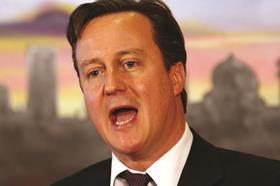Government looks at extending existing schemes to prevent plunge in insulation installations

The government is considering prolonging current home insulation programmes to smooth the transition to the Green Deal as part of an urgent bid to ensure the government’s flagship energy efficiency scheme does not prompt a collapse in insulation installations.
The move came as the prime minister received a briefing on how the Green Deal could be modified. As revealed by Building.co.uk last week, David Cameron commissioned the Cabinet Office to come up with ideas to make the scheme viable when it launches in October this year.
Number 10 would not give any details on the review or the timeframe for decisions. However, Building understands, one measure now being considered is issuing fresh targets to energy companies under current home insulation programmes the Carbon Emissions Reduction Target (CERT) and Community Energy Savings Programme (CESP), which are scheduled to wind up by the end of the year.
The programmes are set to be replaced by the Green Deal and Energy Company Obligation (ECO), which are being finalised by the government. However, the government’s original impact assessment for the Green Deal and ECO schemes predicted the volume of insulation work would fall by 93% for loft insulation and 70% for cavity wallinsulation.
Sources close to the government’s thinking said using CERT and CESP to insulate more homes was among the options under consideration to mitigate against a massive drop in insulation installations.
Andrew Warren, director of the Association for the Conservation of Energy, said: “It’s obviously an option for there to be a CERT Mark 2, but there’s no formal proposal.”
David Adams, director of energy at Willmott Dixon Energy Services, said the move to “actively consider approaches to transition from CERT or CESP is helpful for everyone in the industry”.
A Department of Energy and Climate Change (DECC) spokesperson denied the plan was under consideration.
Concerns have grown over the government’s proposed “soft launch” of the Green Deal since Building revealed in March that the major energy companies were lobbying ministers to delay the October launch to ensure everything was in place “100% end-to-end”.
This week energy minister Greg Barker said he would find extra funding for a marketing campaign to drive take up.
His commitment followed a report by the environmental think tank Green Alliance, which concluded: “Only a government-initiated, national campaign can provide the visibility, trust and wider context that will help to guarantee the success of consumer facing energy schemes.”
Speaking at the report’s launch Barker said that there was currently no funding for such a campaign in the DECC budget but that government needed to be “pragmatic”.
He added: “I will be looking again [at budgets] knowing how important the Green Deal is. It’s a central core part of our programme.”
Though Barker was keen to emphasise a national campaign would be designed to support campaigns by Green Deal providers and not to replace them.
Barker has insisted that the Green Deal will still be launched in the autumn. However, it is understood that because all the delivery systems for the scheme will not be in place by October, DECC is now considering limiting it, in the first instance, to low income households, or else rolling out the programme on a staged regional basis.



























2 Readers' comments